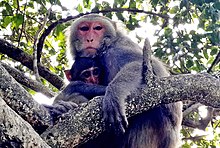Formosan rock macaque
| Formosan rock macaque[1] | |
|---|---|

| |
| Scientific classification | |
| Domain: | Eukaryota |
| Kingdom: | Animalia |
| Phylum: | Chordata |
| Class: | Mammalia |
| Order: | Primates |
| Suborder: | Haplorhini |
| Infraorder: | Simiiformes |
| Family: | Cercopithecidae |
| Genus: | Macaca |
| Species: | M. cyclopis
|
| Binomial name | |
| Macaca cyclopis (Swinhoe, 1862)
| |

| |
| Formosan rock macaque range (blue — native, red — introduced) | |
The Formosan rock macaque (Macaca cyclopis), also known as the Formosan rock monkey or Taiwanese macaque, is a
Physical characteristics
Rock macaques measure 50–60 cm and weigh 5–12 kg, generally females are smaller. Their tails are moderately long and measure 26–45 cm. The Formosan rock macaque is brown or gray in color. Like all other macaques, it has specialized pouch-like cheeks, allowing it to temporarily hoard its food. The gathered morsels are eaten sometime later, in safe surroundings.
Life and behavior

Among the 22 species of the genus
Formosan rock macaques live in mixed
Rock macaques are
Reproduction
The Formosan rock macaque gives birth to a single offspring. During
Conservation
Formosan rock macaques are hunted for the damage they do to crops. They are also hunted for the purpose of exports for medical experimental use. In Taiwan, there is a strong culture of feeding macaques (in parks, along roadsides), particularly on the west coast, which increases their interaction and incidents with humans. Recent efforts by the government have tried to stop this behaviour, with mixed results.[citation needed]
See also
References
- OCLC 62265494.
- . Retrieved 12 November 2021.
- ^ a b Hsu, Minna J.; Lin, Jin-Fu (2001). "Troop size and structure in free-ranging Formosan Macaques (Macaca cyclopis) at Mt. Longevity, Taiwan" (PDF). Zoological Studies. 40 (1): 49–60. Archived from the original (PDF) on 2011-07-19. Retrieved 2009-09-13.
External links
- ARKive - images and movies of the Formosan rock macaque (Macaca cyclopis)
- Primate Behaviour (November, 2006)
- Animal Diversity Web (November, 2006)
- Hsu, M.J. and Lin, J. (2001) Troop Size and Structure in Free-ranging Formosan Macaques (Macaca cyclopis) at Mt. Longevity, Taiwan. Zoological Studies, 40 (1): 49 - 60.
- Formosan macaque revival raises ecological questions – Taiwan Journal, Jan 06, 2004 (November, 2006)
- 台灣獼猴 (in Chinese)

